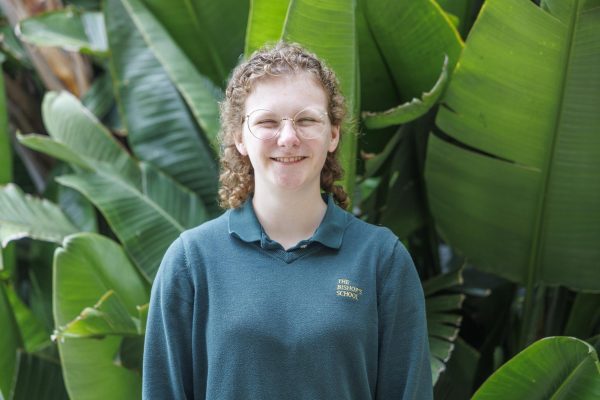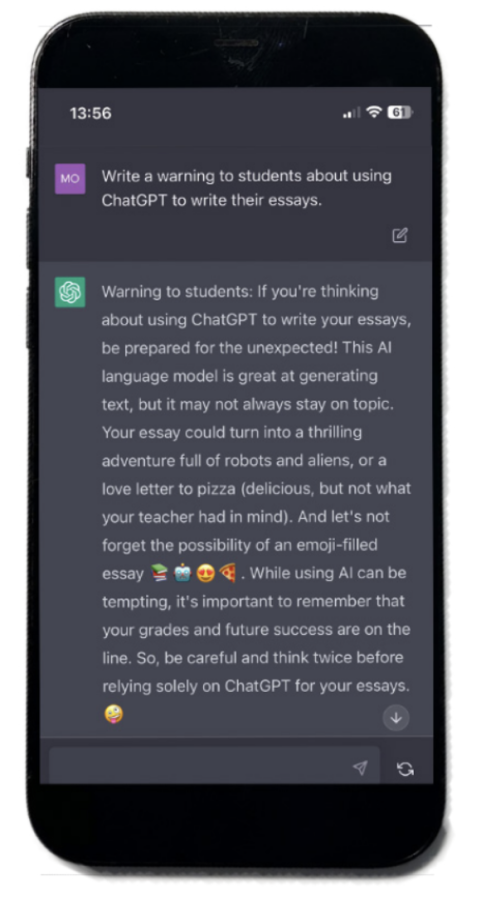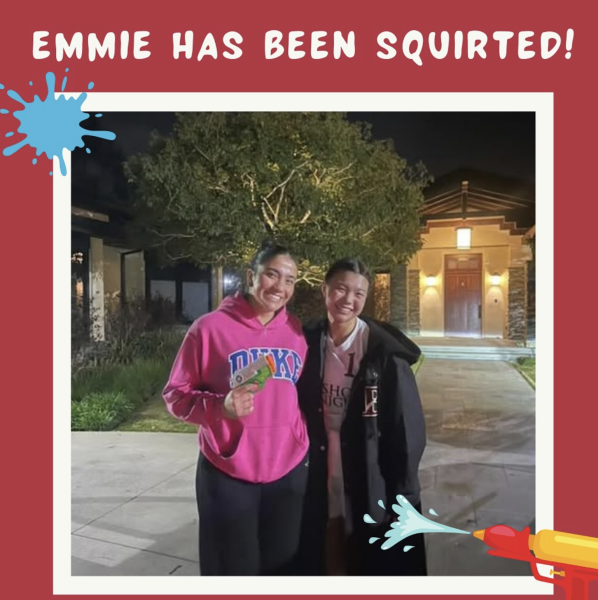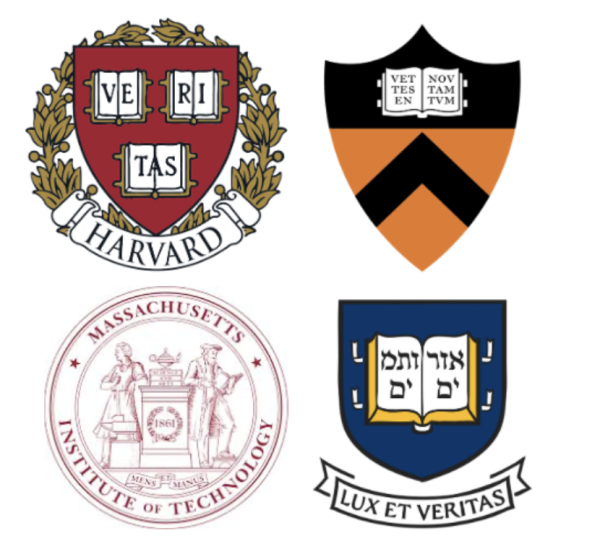The Good, the Bad, and the Plagiarism
Teachers respond to the growing usage of ChatGPT
ChatGPT can respond to even the most bizarre questions, which concerns teachers who anticipate their students might use it to write essays.
It can generate a five-paragraph essay in seconds. It can produce a short story mimicking Edgar Allan Poe’s writing. It can write Shakespearean sonnets, summarize books, and create speeches in the style of former presidents. No, Google didn’t just get an upgrade; this is all ChatGPT.
ChatGPT, which stands for Chat Generative Pre-Trained Transformer, is a chatbot built by OpenAI that serves as a conversational computer program. It allows users to input a question or request — anything from “write me a paragraph about hubris in Macbeth” to “create a warning about the stampede-related hazards of shopping on Black Friday” — and it will respond with its best, most human-like answer. But while this versatility — its ability to compose music, answer questions, write fairy tales, and create screenplays — interests and delights the average user, the reactions from teachers have been mixed.
Some, like English teacher Dr. Clara Boyle, believe that it can be an instrument for good. “We have all sorts of devices that help us think and do,” she explained, “and I would never say to a math student that they shouldn’t use a calculator.”
Chair of the English Department Dr. Anna Clark agreed, to some extent. She said, “We’re considering what it offers us as well as some of the hazards,” referring to the meetings regarding ChatGPT occurring throughout the various departments at Bishop’s.
Chief among those advantages is how it offers “the opportunity to reflect on essay conventions and originality as we discuss the writing process in our classes,” clarified Dr. Clark. “We don’t just want them [the students] to write clean sentences or say what other people say, but rather engage rigorously and attentively with ideas.”
And while most people’s initial thoughts are about how this could help students, the New York Times podcast Hard Fork welcomed a guest who suggested the possibilities this opens up for teachers. English teacher of 30 years Cherie Shields, who was on the January 13 episode of the show, has already started implementing ChatGPT into her classroom and said it can be a tremendous help.
When she inputted an essay into the program, she remarked, “It said, here’s what you’re doing well. And then it said, here are some places to work on. And it even said stuff like, your transitions aren’t very smooth, and your introduction is lacking.” This one-on-one feedback alleviates some of Shields’ stress by giving each of her 80 students personalized tutoring, without her help.
These reactions paint ChatGPT in a rosy, incredibly positive light, but some teachers think that it can also have negative effects on learning. Mr. Matthew Valji, a History and Social Sciences teacher, agreed that ChatGPT is a sort of writing calculator, but he noted that “it is critical that students build foundational skills without the use of a calculator,” and ChatGPT might stunt that process. “It still counts as plagiarism even if the entity you are copying from is electronic rather than organic,” he insisted.
Dr. Clark agreed that “it raises ethical questions surrounding plagiarism,” but she also acknowledged that there is not a clear solution, and she doesn’t think banning ChatGPT is necessarily the answer. But the School seemed to have other ideas, writing in the January 26 edition of the Daily Bulletin that “The use of AI, ChatGPT, or other chatbots on written academic work is prohibited except at the explicit behest of teachers.” This may seem like a strict rule, but it is actually one of the more lenient school policies regarding ChatGPT.
On January 3, New York City’s Department of Education announced a ban on ChatGPT from its schools’ devices. Jenna Lyle, a spokesperson for the department, said in an email statement that “while the tool may be able to provide quick and easy answers to questions, it does not build critical-thinking and problem-solving skills.” Ironically, this response does seem to be a quick and easy answer — if not somewhat ineffective, as students will still be able to access ChatGPT outside of school — to a complex issue.
But even if students did use ChatGPT to cheat, they are not necessarily receiving accurate information, which undermines effectiveness and efficiency. The Washington Post affirmed that “even the most fluent answers sometimes suffer from collapses of logic or contain complete fabrications,” which can be explained by the way the program is designed. “ChatGPT doesn’t ‘think’ but instead predicts … ChatGPT makes its best guess at what should come next, based on the words, phrases, and concepts most commonly strung together in the set from which it learned.” This doesn’t guarantee accuracy, so perhaps turning in an AI-generated paper is not the most effective method of plagiarism.
But cheating isn’t the only issue that ChatGPT could lead to. As Dr. Boyle noted, “Because ChatGPT mines existing ideas, it would — in theory — cut off the possibility of new ideas.” The program is a parrot, and while parrots are adept at regurgitating information they have heard before, they are not especially good at creative thinking and forming new theories and ideas.
But inaccuracies and lack of creativity aside, some English teachers think that the writing itself is not good enough to fool them if it were to be turned in as an essay. “In terms of the quality of writing, it’s not extraordinarily good prose,” admitted Dr. Clark. Dr. Boyle agreed, saying that “it writes neat sentences, grammatically correct and coherent, but a little bit clichéd.” She added that “it offers pretty superficial answers to questions, and its abilities are pretty limited.”
Despite its shortcomings, ChatGPT can excel in certain areas. “A cover letter is a way to determine whether or not a person has basic communication skills but it follows lots of conventions,” explained Dr. Clark, “and ChatGPT is excellent at reproducing that kind of writing.”
ChatGPT may not be perfect, but it is important to note that it will get better. History and Social Sciences teacher Mr. Damon Halback predicted that “the next iteration [GPT-4] coming out next year will be much more powerful and likely include footnotes and other documented sourcing,” and warned that “the degree to which this can be used as a plagiaristic device will increase.”
It is also important to note that there is existing software that can detect writing generated by ChatGPT, but it is not 100 percent accurate, and there are also systems being created to circumvent these detectors. When one of these systems gets better, it forces the other to do as well, and the cycle continues.
But no matter how ChatGPT is used and how schools decide to respond to it, “teachers and students should engage in an ongoing conversation,” concluded Dr. Boyle.

Lucy is a senior and Lead Content Editor for The Tower. This is her fourth year on the staff and second on the editorial team, and she can’t wait to...







